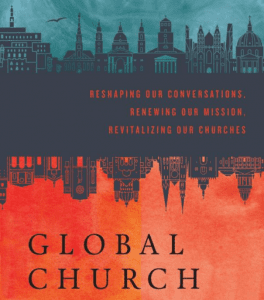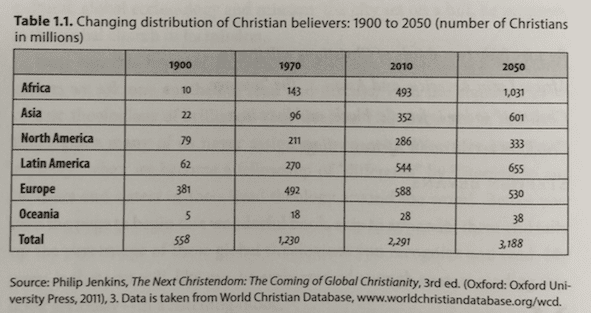 That is an interesting question. How does one answer that question? By where we stand. Do we stand in such a way that our narrative is the narrative of how the church of the 1st Century got to us or how we can take our goods to them? (Isn’t that colonialist?) Or is a narrative of how the church has become truly global? Of how we are but a part of a larger drama? (Isn’t that global?)
That is an interesting question. How does one answer that question? By where we stand. Do we stand in such a way that our narrative is the narrative of how the church of the 1st Century got to us or how we can take our goods to them? (Isn’t that colonialist?) Or is a narrative of how the church has become truly global? Of how we are but a part of a larger drama? (Isn’t that global?)
How can we become more global without losing our connection to the local? How can we become more global by learning a narrative that embraces our local into the global church’s story? I recommend heartily the new book by Graham Hill called Global Church: Reshaping Our Conversations, Renewing Our Mission, Revitalizing our Churches (IVP, 2015). This truly is an important book, and its impact will take years to absorb — generations. Absorbing it, however, can be revolutionary as it draws us into a worldwide movement of God.
Check out TheGlobalChurchProject.com
Graham’s first book was one of the most dialogically important books I have read, and now this book takes that book to its next level. Furthermore, Graham is an “activist” for glocalization and that is seen in his website and his work to foster a greater awareness of the global church and its impact on the local church.
I was honored to be asked to write the foreword to Graham’s new book.
Look at this graph to see how the church is changing, and then read the paragraphs below it. The paragraphs reflect what we can do in light of these shifting numbers.
In light of this, Graham Hill, of Morling College in Sydney, has this to say:
Those of us in the West need a new narrative. It’s time to abandon our flawed Eurocentric and Americentric worldviews. We need a new, global and missional narrative, and for that we must turn to the churches of Majority World and indigenous cultures. They can help us explore what it means to be a global missional community. Many Christian communities in Majority World and indigenous contexts have been wrestling with these issues for generations. Marginalization and persecution and alienation have been their lot. Yet somehow, in spite of or because of that, they have flourished. In fact, they’ve grown exponentially.
So, whom am I talking about when I refer to Majority World and indigenous Christians? Majority World Christians are those in Africa, Asia, the Caribbean, Eastern Europe, Latin America, the Middle East and Oceania.9 I use the term Majority World because the majority of the world s population is in those cultures today. The majority of the church is in those cultures too. I don’t use the terms non-Western or Third World or Developing World. These terms use Western cultures as their point of reference. They imply Western superiority or centricity. The term Global South is too limiting, given the breadth of the group I am engaging. Majority World seems to work best.
The aim of this book is to help Western churches rediscover what it means to be salt, light and a city by engaging in global missional conversations. To do this, Western Christians need to enter into conversation with Majority World and indigenous Christians. Listening to others helps us grow in our understanding and practice of mission and church and theology. For far too long we’ve marginalized or ignored Majority World and indigenous voices. We must truly become a GlobalChurch. 16-17
What is your church doing to be more global or to embrace your story in the larger global story of the church?
The essence, then, of Graham Hill’s proposal is glocalization, that is, the reality that the local is impacted by the global and the global impacts the local. By this we can learn from the global church as the global church learns from us, but we must be in communication for this to occur.
Hill contends there are six core practices in glocalization of God’s mission:
1. Glocal theology practices its values.
2. Glocal theology practices humility (and it tells a new narrative).
3. Glocal theology practices expansiveness.
4. Glocal theology practices attention.
5. Glocal theology practices embrace.
6. Glocal theology practices discernment.
What does a glocalized mission look like? Join us for a series on Graham’s book.












